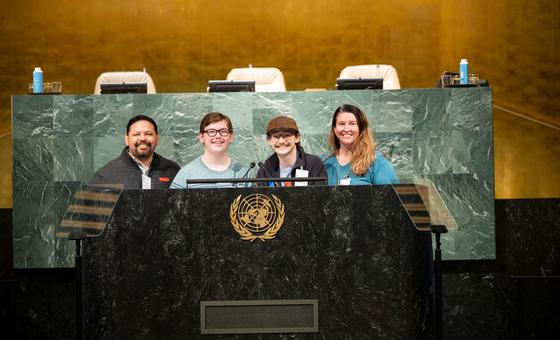A year ago, Kale, who lives in California, started to have blurred vision in his right eye. After taking medical tests, his family received the devastating news that he had a tumour located in his right optic nerve.
“This year has been a struggle for Kale,” says his father, William, explaining that, on top of battling cancer, his son is going through the usual upheavals faced by teenage high school students.
The oldest of two boys, Kale, whose parents are both history teachers, has an interest in foreign and international relations, and dreams of becoming a diplomat. “The UN is one of the biggest forces for international relations on the planet Earth,” he told UN News. “It interests me a lot. And since the headquarters is here in New York, a city that I also want to visit, I figured it would be a really cool place to experience”.
Improving the odds of recovery
The Make-A-Wish Foundation believes that granting wishes can change the odds for children fighting illnesses, helping them to look past their limitations; support families dealing with anxiety; and bring joy to entire communities.
The Foundation enables around 15,000 wishes to come true in the United States each year, guided by referrals from medical teams. “On average, it takes between six to 18 months to have your wish granted”, explains Coleen Lee from Make-A-Wish Foundation. “This is the first time a child has expressed a wish to come to the UN!”
“The United Nations is important for me to visit because of the integral work that is done there, from humanitarian missions to peacekeeping efforts all in the hopes of making the world a better place,” Kale wrote in the wish he sent to the Foundation. “That is why I think it would be important to see the place so I could better understand the work that goes on there, and how these decisions are made”.

Creating a day to remember
When the UN received the request from the Foundation, they tried to put together a bespoke programme to ensure his visit would be memorable.
“To make it all worthwhile, we decided to organize not only a guided tour but also give Kale the opportunity to meet high level staff members and diplomats,” explains Rula Hinedi, Chief of the Guided tours Unit at the United Nations.
The day starts early with a guided tour. “It was awesome, I am in awe”, says Kale, smiling. “I really liked the General Assembly. I was able to stand at the podium and it was cool being in the same place as great people before me. That was very powerful”.
He was greeted by members of the Department of Safety and Security, including Paula Goncalvez, the highest female ranking officer, who has over 25 years’ experience. “We want you to enjoy the experience here”, she said. “It is a wonderful organization, and we are happy you chose us!”
In the Security Council consultation room, Kale met Officer Richard Norowski. Kale’s visit, and his Make-a-Wish badge, brought back emotional memories for Officer Norowski, who accompanied his sister on a Make-a-Wish trip to Disneyland, when was seven years old. “My sister had leukaemia. I will never forget that, and the badge means a lot to me”.

High-level career advice
The next part of the visit involved a series of meetings that might help Kale to achieve this goal in the future.
Maher Nasser, Director of the Outreach Division in the Department of Global Communications, shared his personal experience of rising through the ranks at the UN, and suggested the kinds of academic studies that could help Kale to achieve a career either as a diplomat, or as an international civil servant at the UN.
“Follow your dream no matter what”, said Mr. Nasser, “and the stars will align to make your dream come true”, adding that he hoping to see Kale in the corridors of the UN in a few years.
The Ambassador of France to the United Nations, Nicolas de Rivière, and Diarra Dime-Labille, the Legal Counsellor at the Mission, and Head of the Human Rights, Humanitarian and Influence Affairs division also gave Kale advice, and shared their experiences.
“You have to be open-minded because a lot of time you have to work and negotiate with countries who have different goals, different visions than ours,” explained Ms. Dime-Labille. Our ultimate goal is to create a peaceful world, the goal that the countries had when they created the United Nations”.

‘Do your best to be better’
Kale and his family are full of hope for the future. “We have about six to 12 months to go before we hit what they called the maintenance program”, says his mother, Robin.
“In the last two reports the tumour shrunk, and Kale has regained some eyesight in his right eye, says his father. “Hopefully, next month we will get more positive results”.
Rula Hinedi admits that she was moved by the experience of meeting Kale and his family. “It really touched me. It humbled me a lot”, she says. I think that a request from a 16-year-old boy to visit the United Nations is a strong message to all of us that the work that goes on here is still relevant, especially for the new generation. Things are not always easy, but the world is surely a better place because of the UN”.
Reflecting on the trip, Kale says that learning about the good that the UN does around the world, has inspired him to work in the service of others.
“Just do your best to be better,” he says, “because when you’re better, you can help others be better, and it’s just going to be a positive chain reaction. Be helpful and be kind. That’s my message”.

